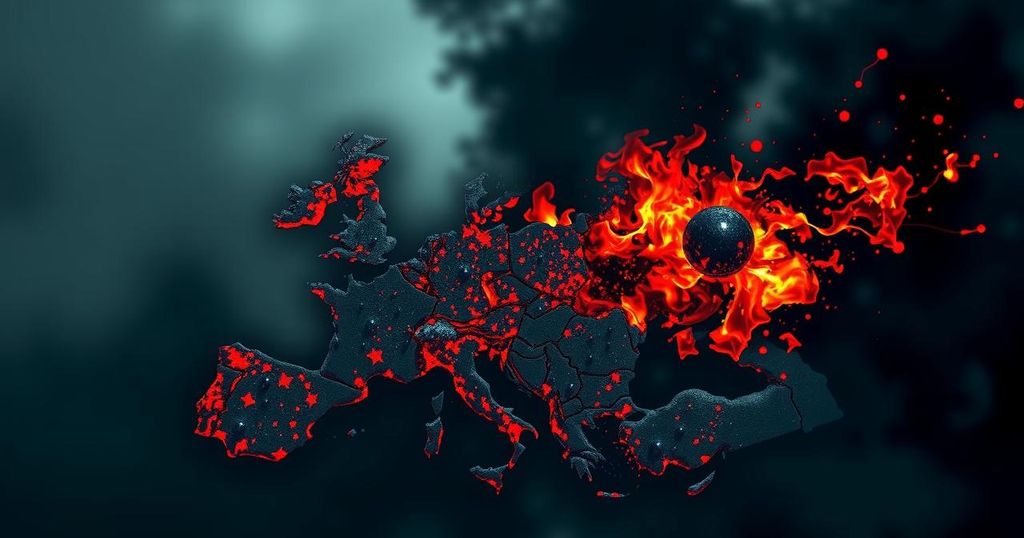From Namibia to Gaza: Germany’s Complicity in Genocide Revisited
This article discusses the backlash against Israel’s military actions in Gaza and Lebanon, highlighting protests across Europe demanding an end to violence and arms embargoes against Israel. It features Germany’s controversial support for Israel amidst accusations of genocidal actions and discusses Foreign Minister Annalena Baerbock’s remarks justifying civilian casualties in the conflict, which have drawn significant criticism, including historical comparisons to past atrocities committed during Germany’s colonial rule.
The current humanitarian crisis unfolding in Gaza and Lebanon has provoked widespread condemnation across Europe, with protests erupting against what many perceive as a genocidal campaign by the Israeli regime. Since the initiation of hostilities in October 2023, the Israeli military has executed numerous targeted assassinations, including the recent killing of Hamas leader Yahya Sinwar during a confrontation in Rafah. Prime Minister Benjamin Netanyahu has attempted to deflect accountability for the ongoing violence onto individual leaders of resistance groups, suggesting that the elimination of such figures would lead to a swift conclusion of the conflict. In Germany, escalating demonstrations against the Israeli military actions have faced suppression, with police employing aggressive tactics to disperse crowds in Berlin who were expressing solidarity with Gaza. Simultaneously, protests across the United Kingdom and Belgium have centered on demands for an arms embargo against Israel, with demonstrators accusing their governments of complicity in the ongoing bloodshed through the provision of military support. Significantly, Germany’s Foreign Minister Annalena Baerbock has faced backlash for implying that civilian casualties in Gaza may be justified in the context of Israel’s right to self-defense. Her statements were met with outrage, resonating even among global leaders and organizations which have condemned such rhetoric as an endorsement of violent reprisals against civilians. Amid these developments, the narrative surrounding Germany’s historical role in colonial genocides has resurfaced, drawing parallels between past and present atrocities. The ongoing events have generated increased scrutiny over Germany’s military relationship with Israel amidst allegations that it facilitates war crimes. Assertions that there is no evidence of genocide occurring in Gaza have been criticized, prompting organizations like Hamas and the Palestinian Islamic Jihad to denounce Baerbock’s comments as an inexcusable oversight of moral imperatives. Germany’s colonial past provides a complex backdrop to its current geopolitical stance, raising ethical questions about its support for the Israeli government in light of human rights violations.
The topic of this article revolves around the ongoing conflict between Israel and Palestine, particularly the humanitarian crisis in Gaza. In recent months, the situation has escalated, with notable casualties and widespread military actions taken by Israel. The international response, particularly from Western countries like Germany, has sparked significant protests and debates over complicity in alleged genocidal actions by Israel, reminiscent of Germany’s own historical offenses during its colonial past. This context is crucial in understanding the current geopolitical dynamics and the moral implications of state support for military actions that may infringe upon human rights.
In summary, the article portrays a dire picture of the humanitarian catastrophe in Gaza and Lebanon, fueled by aggressive military actions and political rhetoric from Israeli leaders. Widespread protests in Europe highlight public dissent against governmental complicity in perceived war crimes. The remarks made by German officials further complicate the discourse around accountability and moral responsibility in international relations. The evocation of Germany’s colonial legacy adds considerable weight to the argument against its current support for Israel, underscoring the need for ethical reflections in policy decisions regarding military alliances.
Original Source: www.tehrantimes.com




Post Comment